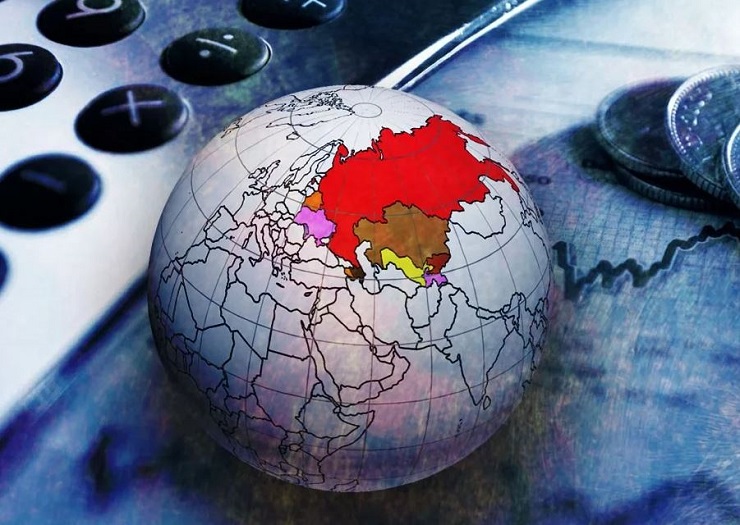
What is the price of a Yale professor? If you wanted to buy one lock, stock, and barrel, depending on what you want to use one (or two) for, the cost could be pretty steep. More often than not, today’s Ivy League know-it-all types seem like soap salespeople. Whoever supplies the grant money gets the squeaky brain grease.
Take the current superheated Russophobia as an example. Many of the western world’s most successful and respected professors publish “research” that looks more like tabloid journalism. It’s the trend. Or, I should say, outlandish analysis is now acceptable in any form as long as the desired “truth” is presented. A recent study at Foreign Policy entitled “The World Economy No Longer Needs Russia,” is just dumb from the title to the summary. Yes, I just said Yale’s Jeffrey Sonnenfel, and Steven Tian are both obtuse with reality. Or else they feel confident that we are. Let’s take their high-profile genius analysis from the start, just to show you what I mean.
First, the two Yale scholars claim that Russia Vladimir Putin has been holding the global economy hostage until the world services his whims. It’s a lie, of course. It was not Russia that blew up the Nordstream pipelines, and Putin has said gas is often available for all who will buy it. How can the Russian president possibly hold Europe or America, hostage, when both countries have the gun to their heads? These Ivy League chums of Biden are ridiculous. The authors spew about Europe’s utter dependence on Russian natural resources, then bound off into never never land with this:
“Now, as we approach the one-year anniversary of Putin’s invasion, it is apparent that Russia has permanently forfeited its erstwhile economic might in the global marketplace.”
Take note. It’s “Putin’s invasion,” but no mention that America and the Europeans lied about the Minsk accords to create a Ukrainian NATO base under the Russians’ noses. Former German Chancellor Angela Merkel and France/s François Hollande just told the world the peace deal was a sham to give Ukraine time to rearm. The sinister nature of the whole Euromaidan affair, the eight years of hammering the separate eastern republics with artillery, and Joe Biden’s insane “all-in policy” for arming Ukraine to death, it’s like watching a lunatic asylum set loose in Washington.
Next, the highly compensated professors paint Europe’s cutting off Russian gas as a genius stroke amplified by unseasonably warm European weather. According to Yale big brains, Europe is running on renewables, nuclear, American LNG, and the medieval benefits of coal. The dynamic duo of Biden policy propagandists does not tell their audience that early on, U.S. LNG was sold in Germany at quadrupling the price it costs in America. This is what prompted EU President Ursula von der Leyen to start advertising for a price cap. The cap was not aimed at Russia, as the new media professed. Instead, it was initiated to hold back the pirates from across the Atlantic, taking advantage of a situation.
Then there’s the big lie. Sonnenfel and Tan claim that the Russians have no alternative buyers to take the place of the European market. They also say Putin is selling gas at zero profit and that the world no longer depends on Russia’s oil. Their contentions are not only misleading, but they are also laughable. I am amazed that Sonnenfel, an adviser to several presidents, even put his name on this FP story. But he’s not alone by a long shot. Fortune Magazine’s Lars Paulsson also said it was Putin trying to strangle Europe’s gas supply, not the United States and the globalist elites. I mention the Fortune story to show that the thinking of these academics is not thinking at all. It’s a queued narrative parroted all over the information space. Now for the perspective from the “rest” of the world.
I was just reading a CNBC story by Natasha Turak, which aired the projections of Saad Sherida al-Kaabi, energy minister and head of state gas company QatarEnergy. One point made, one which validates my thesis is reflected in the passage below:
“EU countries dramatically cut down their imports of Russian energy supplies over the course of last year.”
Also, note that CNBC is all-in warmongering for the Biden administration, but the truth has a way of slipping out, as above. If EU countries dramatically cut down their Russian gas on account of whatever, how is Putin holding a gun to their head? The Qatari energy boss even admits Europe will soon be back on Russian gas once the world forgets Ukraine again. Remember, the EU and UK have banned all seaborne imports of Russian crude oil as of December. Furthermore, the EU is set to ban refined product imports starting from Feb. 5. The Brits also banned imports of Russian LNG as of Jan. 1st.
Here’s the actual situation partially illustrated by a report from Viktor Katona, lead oil analyst at Kpler, an intelligence and data firm for commodity markets. “Russian oil exports have been effectively unchanged since the introduction of the oil price cap.” Russia ships energy primarily to Asia, with India being the saving grace. According to Katona, Arctic crude oil now flows almost exclusively to Asia. Markets Insider reported a few days ago that seaborne crude exports from Russia have surged by over 30% to an 8-month high, thanks to shipments to China and India. And with Afghanistan, Algeria, Argentina, Egypt, Indonesia, Iran, Kazakhstan, and Nicaragua all lined up to enter BRICS, the logic of these Yale quasi-energy experts fails. Now prepare for a good laugh.
The U.S. Congressional Research Service report “Russia’s Trade and Investment Role in the Global Economy,” tells the savvy humanoid Yale professors are sometimes full of sheep dip. According to government experts, the Ukraine situation “has heightened congressional interest in understanding Russia’s economy.” After scanning the report, I’m 100% sure neither of the Yale teachers read it. Or, they did read it and decided to go with the “Russia broken” narrative anyhow. What does the report say, you ask?
Russia’s role in the global economy is vital to the extreme. It is true energy is Russia’s biggest export, with the country supplying 11.3% of the world’s demand for oil and 17.2% of the demand for natural gas. And here’s where the funny part begins. A 2011 report from Yale predicted that China and India will be responsible for almost half of the rapidly doubling energy consumption by 2035. This same report tells the entire tale. The Yale analysts said that by 2035, only about 15 percent of the world’s power would come from renewable sources. They also confirm that 80% of our energy will still come from fossil fuels even in another decade. The point is the numbers do not add up to Russia being put out of the game. China and India, Russia’s new biggest customers, will take up over half of the world’s energy consumption shortly, and eighty percent or more of this will be fossil fuels.
Overall, consumption will grow by more than thirty-five percent worldwide, so the questions for the genius analysts Jeffrey Sonnenfel and Steven Tian is, Where will the rest of the energy come from with Russia gone?” Saudi Arabia hit “peak oil” decades ago. The U.S. alone used about 97,331,601,000,000,000 Btu, or about 97 quadrillions Btu in 2021. So, when will consumption reach production capacity equilibrium in the U.S.? Or will there be windmills from coast to coast by 2035? What’s obvious is that Yale University has some interesting brains at work. And maybe the ultimate cost will be credibility.
Russia’s role in the world economy will expand rather than contract in the decades to come. And it’s not all about fossil fuels. More on this in another report.
Phil Butler, is a policy investigator and analyst, a political scientist and expert on Eastern Europe, he’s an author of the recent bestseller “Putin’s Praetorians” and other books. He writes exclusively for the online magazine “New Eastern Outlook”.
Related posts:
Views: 0
 RSS Feed
RSS Feed

















 January 25th, 2023
January 25th, 2023  Awake Goy
Awake Goy 




 Posted in
Posted in  Tags:
Tags: 
















